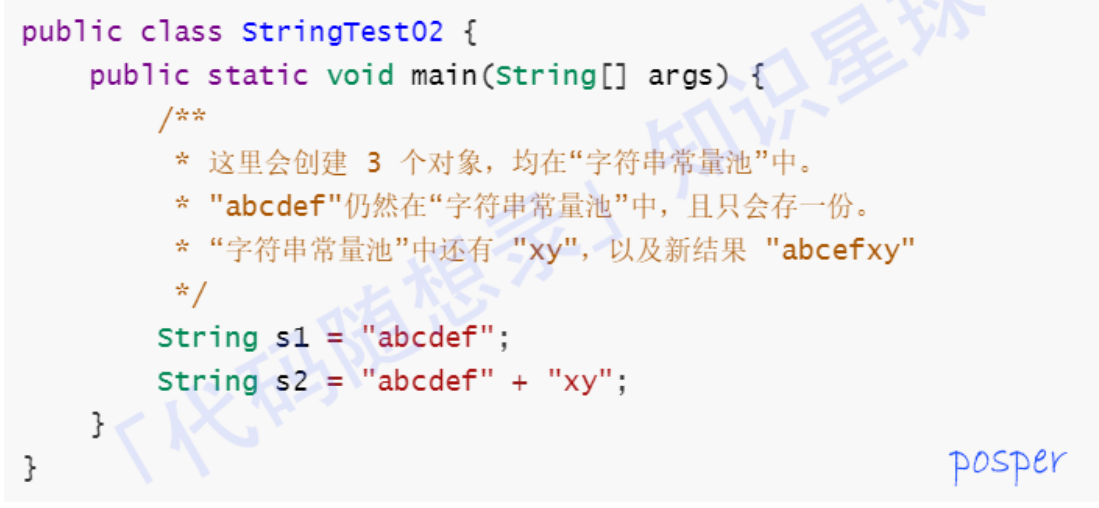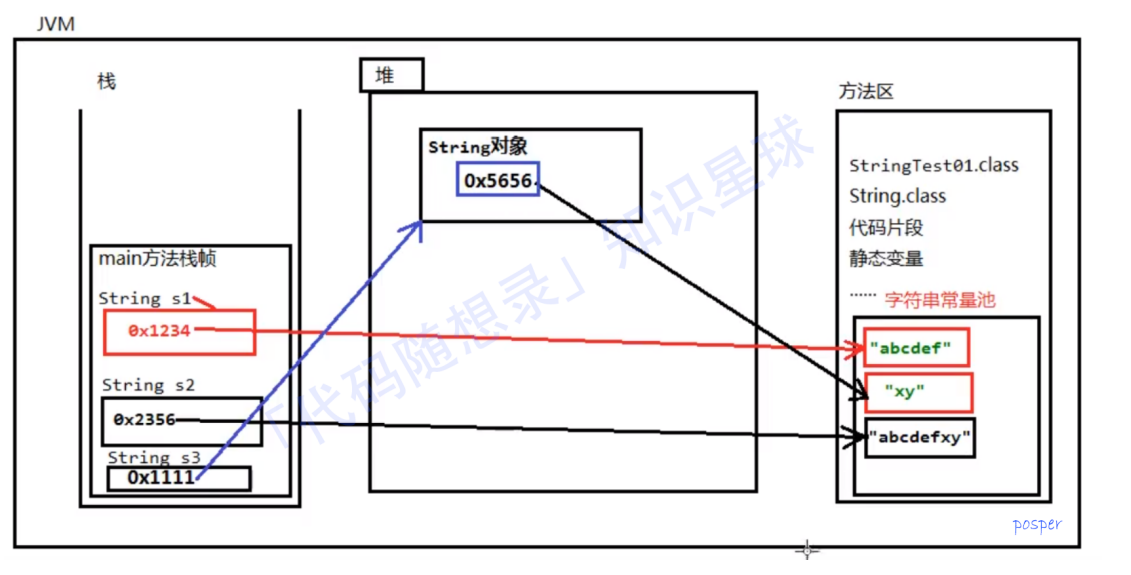String存储原理
- String类型是不可变的
- java中用双引号括起来的字符串
- 为什么把字符串存储在一个字符串常量池中?
- 字符串在实际开发中使用频繁
- 要提高执行效率,所以把字符串放到了方法区中的字符串常量池中



String、StringBuilder、StringBuffer 部分源码解读
- String 底层数组⽤ final 修饰,不可变。
public final class String
implements java.io.Serializable, Comparable<String>, CharSequence {
/** The value is used for character storage. */
private final char value[];
- StringBuilder 底层数组没有⽤ final 修饰,可变;线程不安全,效率⾼(⼀般⽤的多)
public final class StringBuilder extends AbstractStringBuilder implements java.io.Serializable, CharSequence
{
/** use serialVersionUID for interoperability */
static final long serialVersionUID = 4383685877147921099L;
/**
* Constructs a string builder with no characters in it and an
* initial capacity of 16 characters.
*/
public StringBuilder() {
super(16);
}
/**
* Constructs a string builder with no characters in it and an
* initial capacity specified by the {@code capacity} argument.
*
* @param capacity the initial capacity.
* @throws NegativeArraySizeException if the {@code capacity}
* argument is less than {@code 0}.
*/
public StringBuilder(int capacity) {
super(capacity);
}
/**
* Constructs a string builder initialized to the contents of the
* specified string. The initial capacity of the string builder is
* {@code 16} plus the length of the string argument.
*
* @param str the initial contents of the buffer.
*/
public StringBuilder(String str) {
super(str.length() + 16);
append(str);
}
- StringBuffer 底层数组没有⽤ final 修饰,可变;线程安全(⽅法都采⽤ 了 synchronized 修饰 ),效率低(⼀般⽤的少)
public final class StringBuffer extends AbstractStringBuilder implements java.io.Serializable, CharSequence
{
/**
* A cache of the last value returned by toString. Cleared
* whenever the StringBuffer is modified.
*/
private transient char[] toStringCache;
/** use serialVersionUID from JDK 1.0.2 for interoperability */
static final long serialVersionUID = 3388685877147921107L;
/**
* Constructs a string buffer with no characters in it and an
* initial capacity of 16 characters.
*/
public StringBuffer() {
super(16);
}
/**
* Constructs a string buffer with no characters in it and
* the specified initial capacity.
*
* @param capacity the initial capacity.
* @exception NegativeArraySizeException if the {@code capacity}
* argument is less than {@code 0}.
*/
public StringBuffer(int capacity) {
super(capacity);
}
/**
* Constructs a string buffer initialized to the contents of the
* specified string. The initial capacity of the string buffer is
* {@code 16} plus the length of the string argument.
*
* @param str the initial contents of the buffer.
*/
public StringBuffer(String str) {
super(str.length() + 16);
append(str);
}
/**
* Constructs a string buffer that contains the same characters
* as the specified {@code CharSequence}. The initial capacity of
* the string buffer is {@code 16} plus the length of the
* {@code CharSequence} argument.
* <p>
* If the length of the specified {@code CharSequence} is
* less than or equal to zero, then an empty buffer of capacity
* {@code 16} is returned.
*
* @param seq the sequence to copy.
* @since 1.5
*/
public StringBuffer(CharSequence seq) {
this(seq.length() + 16);
append(seq);
}
@Override
public synchronized int length() {
return count;
}



【推荐】国内首个AI IDE,深度理解中文开发场景,立即下载体验Trae
【推荐】编程新体验,更懂你的AI,立即体验豆包MarsCode编程助手
【推荐】抖音旗下AI助手豆包,你的智能百科全书,全免费不限次数
【推荐】轻量又高性能的 SSH 工具 IShell:AI 加持,快人一步
· 震惊!C++程序真的从main开始吗?99%的程序员都答错了
· winform 绘制太阳,地球,月球 运作规律
· 【硬核科普】Trae如何「偷看」你的代码?零基础破解AI编程运行原理
· 上周热点回顾(3.3-3.9)
· 超详细:普通电脑也行Windows部署deepseek R1训练数据并当服务器共享给他人